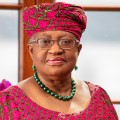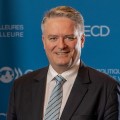Friday, Apr 22, 2022 | 02:30 PM - 03:15 PM
Location: Meeting Halls A&B, HQ1-3-430A&B
Refresh page at start of event to load video player.
Open trade policies are critical to growth and development and are especially important in today’s global context. However, the growing use of market-distorting subsidies can undermine the multi-lateral, rules-based trading system that has promoted trade liberalization and global growth in the past. This event will explore the issue of subsidies—from when they may be appropriate for addressing challenges to the unintended consequences—as well as how international cooperation can promote better subsidies policies and a more effective trading system for countries at all income levels.
 |
Kristalina Georgieva Managing Director, IMF |
Kristalina Georgieva is the Managing Director of the International Monetary Fund (IMF). She is the first person from an emerging market economy to lead the IMF since its inception in 1944. Before joining the Fund, Ms. Georgieva was Chief Executive Officer of the World Bank and also served as Interim President for a time. Previously, she served at the European Commission as Vice President for Budget and Human Resources – and as Commissioner for International Cooperation, Humanitarian Aid and Crisis Response. She was named “European of the Year” and “Commissioner of the Year” by European Voice for her leadership in the European Union’s humanitarian response to crises.
 |
David Malpass President, World Bank Group |
David R. Malpass was selected as the 13th President of the World Bank by the Bank’s Board of Executive Directors on April 5. His five-year term began on April 9, 2019. Mr. Malpass previously served as Under Secretary of the Treasury for International Affairs for the United States.
 |
Ngozi Okonjo-Iweala Director-General, WTO |
Dr Ngozi Okonjo-Iweala is a global finance expert, an economist and international development professional with over 30 years of experience working in Asia, Africa, Europe, Latin America and North America. Dr Okonjo-Iweala was formerly Chair of the Board of Gavi, the Vaccine Alliance.
Previously, Dr. Okonjo-Iweala twice served as Nigeria's Finance Minister (2003-2006 and 2011-2015) and briefly acted as Foreign Minister in 2006, the first woman to hold both positions. She distinguished herself by carrying out major reforms which improved the effectiveness of these two Ministries and the functioning of the government machinery. She had a 25-year career at the World Bank as a development economist, rising to the No. 2 position of Managing Director, Operations. As a development economist and Finance Minister, Dr Okonjo-Iweala steered her country through various reforms ranging from macroeconomic to trade, financial and real sector issues.
 |
Mathias Cormann Secretary-General, OECD |
Mathias Cormann is the 6th Secretary-General of the Organisation for Economic Co-operation and Development (OECD).
Prior to his appointment to the OECD, Mathias served as the Australian Minister for Finance, the Leader of the Government in the Australian Senate and as Federal Senator representing the State of Western Australia.
In these roles, he has been a strong advocate for the positive power of open markets, free trade and the importance of a rules-based international trading system.
 |
Shawn Donnan Writer, Bloomberg |
Shawn Donnan is an award-winning senior writer for Bloomberg News where he reports on the US and global economies. He joined Bloomberg in 2018 from the Financial Times where he served as World Trade Editor and prior to that, World News Editor, coordinating the paper's global coverage of economics and politics. He also worked as a correspondent and editor for the FT in Indonesia and Hong Kong, from where he edited the paper's China coverage. He is a graduate of Boston University.
The growing use of market-distorting and fiscally costly subsidies are contributing to global trade tensions that are harming growth and living standards and undermining the multilateral, rules-based trading system. Against this backdrop, it is essential to enhance international cooperation and multilateral efforts in promoting better subsidies policies and ensuring a more effective trading system for countries at all income levels.
Key Points:
Contributor: Mentor Mehmedi